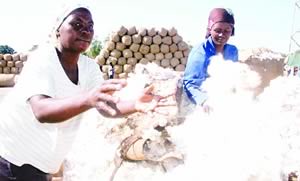
Zimbabwe cotton farmers earned from this year's yield according to a recent article in the state newspaper The Herald. The land redistribution program in this Southern African state has provided farms to people dispossessed by colonialism., a photo by Pan-African News Wire File Photos on Flickr.
Zanu-PF in drive to assist farmers
Wednesday, 11 July 2012 16:21
Takunda Maodza
Senior Reporter
Zimbabwe Herald
The success of the historic land reform is under threat from funding challenges, subletting of farms to white former commercial farmers and double land allocations, provincial governors and resident ministers have revealed.
This has prompted Zanu-PF to embark on a countrywide tour of the farms to access the challenges and recommend solutions.
The party’s fact-finding mission covering Zimbabwe’s 10 provinces follows a meeting between the Zanu-PF Land Reform and Resettlement department led by Cde Ignatius Chombo, his deputy Cde Herbert Murerwa and the governors in Harare on Monday.
The Zanu-PF national secretary for production and labour Cde Dzikamai Mavhaire also attended the meeting.
The governors presented situational reports painting a gloomy picture on developments on farms more than 10 years after the historic land reform.
Litigation by former commercial farmers, leasing of farms to displaced white farmers, double allocation of land, delay in issuing out 99-year leases, including offer letters, and lack of productivity on the farms were singled out as some of the major challenges threatening the success of the land reforms.
The governors bemoaned lack of productivity, especially on A2 farms, saying lack of State financial and material support incapacitated beneficiaries.
Mashonaland West provincial administrator Mr Christopher Shumba said land disputes continued to be experienced in the province due to failure by responsible offices to give offer letters to beneficiaries. “About 75 percent of our people (A2 farmers) in Hurungwe have no offer letters,” he said.
Mr Shumba said lack of funding made it impossible for his office to resolve land disputes, with some of them being fanned by aspiring politicians.
“Some people in Kadoma have gone into the grazing areas and allocated land there. We understand the individual wants to be the next Member of Parliament.
People have moved into grazing areas and started erecting structures. We do not have resources to move around and address these issues spot on,” he said.
A report from the Midlands province singled out lack of production on A2 farms as a major challenge.
“The major challenge is production. A good number of farmers are failing to produce. They have no capacity and it is becoming a problem,” said an official from Governor Jason Machaya’s office.
The same situation prevails in Mashonaland East with a report from the province stating that “productive utilisation of the land had been quite problematic because of shortage of resources”.The province bemoaned dwindling Government support in the form of inputs and agricultural machinery and called for the reintroduction of the farm mechanisation programme.
The report from Governor and Resident Minister Aeneas Chigwedere’s office said there were several cases of sub-letting of land to former commercial farmers in the province by beneficiaries of the land reform.
Matabeleland North bemoaned the delay in the processing of offer letters saying this was disrupting farming activities in the province.
Governor and Resident Minister Sithokozile Matutu’s office said a pressure group was moving around the province illegally parceling out land.
“You find a plot with between four to five people who all claim ownership,” the report revealed.
The province said there were also clashes between prospective miners and new farmers over boundaries with some coal miners encroaching on agricultural land.
“The percentage of farmers fully resident on their land is small.
“Some farmers got land but are out of the country. Some are in South Africa and lease their plots,” the report revealed.
The same situation prevails in Matabeleland South with Governor and Resident Minister Angeline Masuku revealing that “quite a number of people allocated land did not take up their land”.
“There is another disturbing issue. There are too many people allocating land. These people claim that they work with ‘big people’ in the party in Harare,” she said.
Governor Masuku said there was little productivity on A2 farms while A1 farmers were doing well.
She called for the re-introduction of the farm mechanisation programme to assist the A2 farmers who do not have farming implements.
The same situation prevails in Mashonaland Central, Manicaland and Masvingo provinces.
In response, Cde Murerwa said his ministry had set up a Land Resolution Committee to resolve conflicts on double allocation, farm boundaries and other challenges.
No comments:
Post a Comment